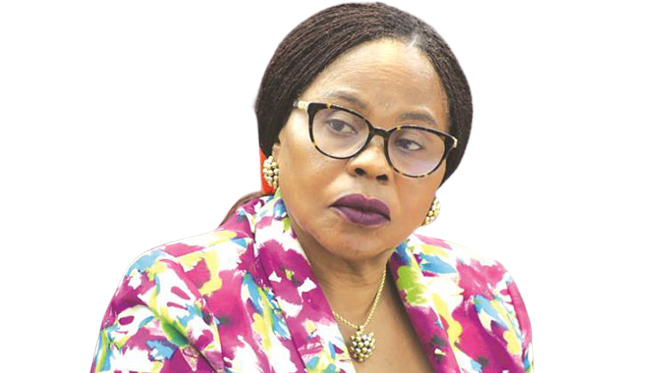So Zimbabwe ruling elite acknowledges there’s persecution in the country! Mbofana

POLITICAL PERSECUTION: Monica Mutsvangwa
She appeared to have been convinced that his arrest (and presumably denial of bail by the courts) was all part of a carefully crafted political persecution plot.
Her son is currently incarcerated, awaiting his bail application, for alleged illegally trading in foreign currency, as well as facilitating services of a yet-to-be-licensed internet service provider, Starlink,
When I listened to the viral audio recording, I found myself thinking: Oh, so these people in the ruling elite actually acknowledge there is political persecution in Zimbabwe!
That is very interesting!
When opposition activists Job Sikhala, Jacob Ngarivhume, amongst others were arrested and jailed on spurious charges, most of us cried ‘political persecution’.
In fact, we were so specific in pointing to what is now termed the ‘weaponization of the law’ as the chief tool of political persecution in Zimbabwe.
This is when the country’s law enforcement and judiciary are abused to settle political scores or punish perceived political opponents.
It is also referred to as ‘lawfare’.
Opponents are arrested and charged with various usually nonsensical crimes, after which our courts send them to prison either by denying them their constitutional right to bail or actually finding them guilty.
This is exactly what we witnessed in utter shock with Sikhala and Ngarivhume.
The former languished in remand prison for nearly 600 days after being repeatedly denied bail, whilst the latter was sentenced to four years in the absence of any prima facie evidence.
Fortunately, Ngarivhume’s politically motivated conviction and sentence were eventually overturned by the High Court after appeal – although he had already spent eight months behind bars.
In the midst of intense public outrage against this undoubted political persecution, the Zimbabwe regime was at pains distancing itself from these cases.
We even had President Emmerson Dambudzo Mnangagwa smugly commenting that he never instructs the judiciary on what to do – as the country’s justice system was independent.
As a matter of fact, Monica Mutsvangwa (while still Information Minister) justified the obvious politically motivated arrest of Ngarivhume and journalist Hopewell Chin’ono in 2020.
This was after the two had urged Zimbabweans to peacefully demonstrate, on 31 July 2020, against rampant corruption and oppression in the country.
Actually, Chin’ono had, at the time, been at the forefront of exposing massive high profile corruption in the procurement of COVID-19 PPEs (personal protective equipment) allegedly between the government of Zimbabwe and Dax International.
The company was represented in the country by Delish Nguwaya, who was said to be a close associate of the country’s ‘first family’.
Mutsvangwa never interpreted these arrests as political persecution, particularly through the weaponization of the law, but rather the wheels of justice turning.
So, what has changed now, Monica?
Are the same wheels of justice – which arrested, repeatedly denied bail to perceived opponents, and even finding them guilty – not supposed to turn in regards to her beloved son, Neville?
Are the police and our courts suddenly no longer independent simply because her son is now at the receiving end?
Since she alleges ‘political persecution’ who does she believe is behind Neville’s arrest?
In fact, who has enough influence in the country to order the police and judiciary to ostensibly persecute the son of a cabinet minister, as well as the ruling ZANU PF party spokesman (Christopher Mutsvangwa)?
If this is indeed ‘political persecution’, so can Monica and even her motormouth husband finally acknowledge that Sikhala, Ngarivhume, Chin’ono, and many others were similarly persecuted?
Are these two willing to retract their statements uttered over the years, whereby they denied any judicial capture and the use of lawfare against opponents?
As a matter of fact, all those in the ruling elite acknowledge there has always been the abuse of our justice delivery system in Zimbabwe to settle political scores.
Why did Mnangagwa flee the country – to the extent of crossing the border into South Africa illegally – soon after being sacked from the vice presidency by then leader Robert Gabriel Mugabe in early November 2017?
He only had the guts to return after being certain Mugabe had been removed from power through a military coup d’état.
What was he so terrified of?
The same applies to former ZANU PF top officials Jonathan Moyo, as well as Saviour Kasukuwere and his sidekick Walter Mzembi.
Where are they now?
Are they not holed up in Kenya and South Africa?
In fear of what?
If there was genuinely no persecution in Zimbabwe, would these high-ranking officials have fled the country after their political fortunes had turned?
What is even more curious is that these were not opposition activists but ZANU PF senior members – yet compelled to run for their lives in fear of their own.
No one can deny that there is little democracy in Zimbabwe – where the justice delivery system is compromised and can be abused to settle political scores.
Therefore, the next time those in power deny the arrest and jailing of opponents as political persecution, they will clearly be lying.
They all know the truth…and they can easily also become the next victims.
Just ask Monica and Christopher!
• Tendai Ruben Mbofana is a social justice advocate and writer. Please feel free to WhatsApp or Call: +263715667700






